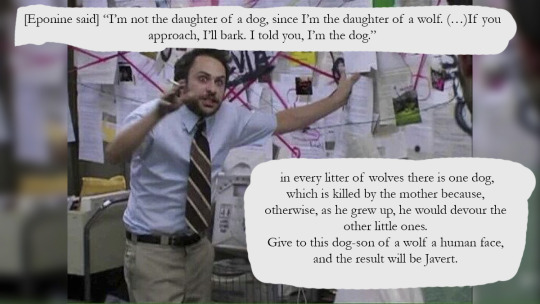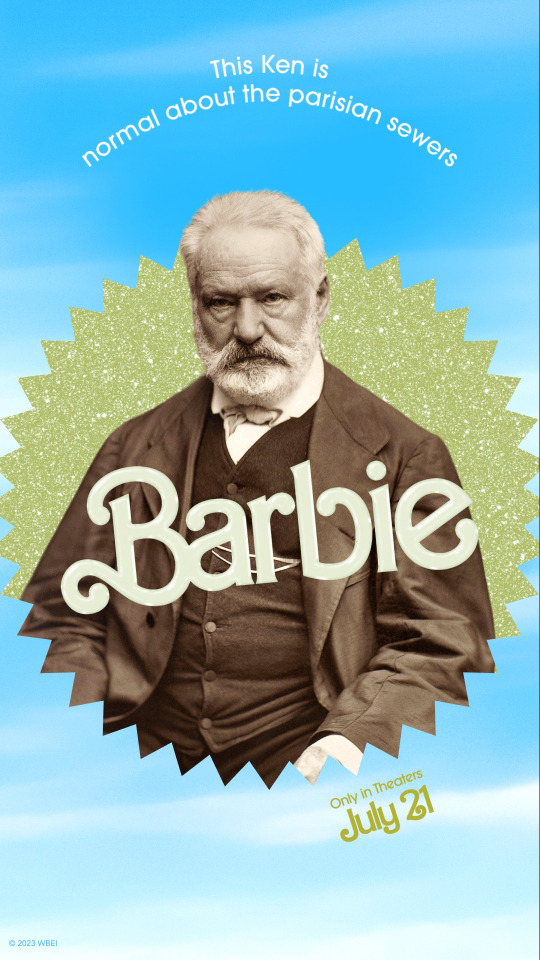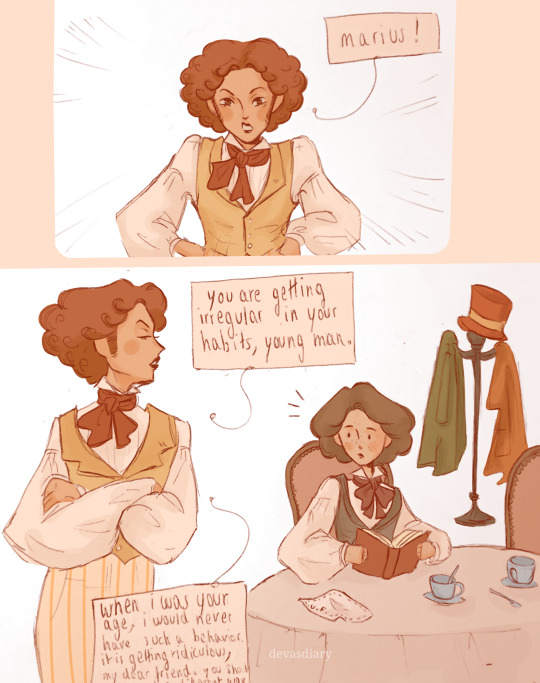#Les mis letters
Text
So I started rereading les mis, in french this time, and I'm sort of catching up to les mis letters (only sort of, for now, since I'm still at chapter 1.2.5 I think) and I do wanna talk about the title of the book because that title has fascinated me ever since I opened that book 14 years ago in its greek translation. So the greek translation of the title "les Misérables" mystified me. I think a big part of western languages have a variation of the word "misérable" in their vocabulary so the translation of the title is pretty much consistent (obviously not every western language, idk what happens with scandinavian translations or hungarian or russian for example). In greek we do not have the word "miserable" or "misery", we kind of use the word "mizeria" but only as a "western" variation of the greek word we have for misery, so we don't have the equivalent adjective. So the original greek translator needed to find a brand new adjective, in greek, to convey the meaning of the title, and honestly, what a task that is, finding the greek equivalent of probably the most iconic title in literature ever, just one word to encapsulate 1500 pages of text.
The word finally used is "Άθλιοι" (Athlioi) the plural form of "Athlios". It's an ancient greek word that is also commonly used in modern greek as is the case for a huge part of our vocabulary. So the ancient greek definition of "Athlioi" is "struggling, unhappy, wretched, miserable". In modern greek, the definition is more or less the same: "seedy, miserable, poor, terrible", except for the last word "terrible" that has an interesting connotation. The definition of "Athlioi" as terrible is an addition of modern greek. "Terrible" by itself maybe doesn't say much and it seems as a mere variation of the classic definition of Athlioi as "miserable, poor, wretched" etc. But from miserable and wretched to terrible there is an interesting leap. While "seedy, miserable, poor, terrible" are the english translations of the greek word "Athlioi" that I find on wordreference.com, I get very interesting results when I inverse the search, this time searching for the greek translation of the following english words (on wordreference or glosbe): despicable, nasty, vile, shady, appaling, loathsome, wicked, infamous, monstrous, horrible, lame, shabby, mangy, mean, vicious. You may have guessed it, all of the above are translated into "Athlios" in greek (among other words). The reason for that is that "Athlios" in modern greek has an extremely negative connotation. An "athlios" is not just a miserable wretched poor outcast. An "athlios" is a despicable human being, one that inspires disgust, one you should avoid in any case. A horrendous, vile, monstrous, hateful, creature. I am not sure if the word "Athlios" already had that definition at the time of the first greek translation (end of 19th century) but my bet is that it did, because that is what the word is primarily used for in Greece ever since I remember myself. When we use the word "Athlios" in greek now we rarely if ever talk about someone "miserable", "poor" or "wretched". We normally talk about someone or something despicable. If it's a person, 99% of the time this has a purely moral connotation aka, someone who is morally despicable. They could be a poor person, (a Thenardier type of vile individual) or they could be rich, doesn't matter really.
I am not sure if the word "misérable" or the english word "miserable" have this connotation. It is one thing to be wretched and totally another thing to be despicable and loathsome. Is this very close to the french word "misérable"? "Misérable" in french primarily means "pitiful, wretched", with one mention of "despicable", it is true. In Larousse however (the classic french dictionary) I cannot find one definition of "misérable" with the "vile, despicable" connotation that the word "Athlios" has. I am sure "misérable" can be used that way, and it can be translated that way in english, but vile and despicable are not the leading definition one thinks about when they encounter the word. When we use the word "misérable"/miserable, we normally do not immediately think of a despicable, vile, loathsome individual. So this choice of title by the greek translator takes some liberties. He could have used our greek word for "pitiful", "outcast" or one particular greek word we have for "scorned" that has a particular depth because it means scorned, neglected and forgotten by society all at the same time. Or he could have went for our word for "miserable" in the sense of "unhappy". All of these could have worked well enough. But he went for "Athlioi". Why? Athlioi is the only word that has a truly negative connotation for the morality of a person, of their moral value, and the way society percieves that moral value.
I got to the chapter "The Evening of a Day of Walking" where Valjean makes his first appearence. The english translation is this:
"It was difficult to encounter a wayfarer of more wretched appearance".
Then Hugo proceeds with a description of his appearance that is particularly unsettling, to say the least. He was literally dressed in rags with iron-shod shoes and he had holes in his clothes. At the end of the description he says:
"The sweat, the heat, the journey on foot, the dust, added I know not what sordid quality to this dilapidated whole".
So that guy is 1) certainly unhappy, 2) clearly wretched, 3) has a sordid quality and 4) a dilapidated look.
It is interesting that in french, the phrase "wretched appearance" is actually "aspect misérable". It is important to note this because this is the first time that the author gives us a description of a character that encapsulates what a "Misérable" according to the title actually is. Moving along, Valjean is not accepted in any inn or house and the people force him to leave because they are horrified by 1) his appearance and mainly 2) his profile as an ex convict that makes him a "Dangerous Man". "Dangerous Man" is literally written on his passport. A pitiful creature is maybe not that loathsome by itself, but a "Dangerous Man" is definitely something that you want to stay away from.
At the chapter "The Heroism of Passive Obedience" (1.2.3) Valjean enters the bishop's house and the bishop's sister sees him and describes him like this:
"He was hideous. It was a sinister apparition."
"Mademoiselle Baptistine turned round, beheld the man entering, and half started up in terror".
"Wretched" and "pitiful" cannot cover the impact this individual had on people, on society. That man was not just deeply unhappy, in a deplorable state, wretched and pitiful. That man was appaling. That man was loathsome. That man inspired horror, disgust, and intense, bone deep hatred. It is important to note this aspect of "misérable". The fear society has for the injustice it creates is so strong that it is far easier to dehumanize these individuals by slapping the label of "despicable", "vile", "loathsome" on them. It makes their total marginalisation easier because it justifies it. People are truly disgusted by and terrorised by Valjean. For society, there is a reason why that man is in a pathetic, deplorable, "miserable" state. It's because he is truly, irrevocably, morally hideous, loathsome and nasty. He is "dangerous". He truly is a monster inside out. And that particular manifestation of social misery is nicely conveyed by the word "Athlios" in my opinion.
#les miserables#aspa reads les mis#jean valjean#les mis letters#catching up#les mis translations#lm 1.2.3#lm 1.2.1#les misérables#aspa rambles#long post#the brick
98 notes
·
View notes
Text




Feeling normal about Javert and Eponine today
#les mis#les mis letters#lm 5.1.19#im very normal about em#i was going to write an essay about them for today#but have this instead#javert-eponine parallels#javert/eponine parallels
4K notes
·
View notes
Text

[Image transcription: “Ah! Monsieur Leblanc”]
yo mister white
4K notes
·
View notes
Text

sorry for the spam this is the shiniest new meme we’ve had in a while
3K notes
·
View notes
Text
Now, as we have Les Misérables musical covering the plot, why don’t we have another one, covering all the digressions?
423 notes
·
View notes
Text
1862

2023

2K notes
·
View notes
Text
#les mis#les miserables#Poll#jean valjean#fantine#Cosette#eponine#marius pontmercy#javert#enjolras#les amis#monsieur thenardier#madame thenardier#patron minette#bishop myriel#the brick#les mis letters#I don’t think I’m missing any one major but if so I’m very sorry#this book just got too many people in it idk what else to say man
330 notes
·
View notes
Text
So when your friend Jonathan Harker goes on a trip and tells you all the details about the places he visits, he's an "adorable dork" and you "can't wait for his next email", but when I, Victor Hugo,
#I've been waiting to make this joke since I learned about Les Mis Letters in December so I hope you like it#Victor Hugo#Waterloo#brick#digressions#Les Mis Letters#Dracula Daily#my stuff
3K notes
·
View notes
Text
my favorite thing about les mis is that every couple of chapters Victor Hugo likes to go oh! who is that mysterious old man?? who could it be???? its a mystery! he's super buff btw, but who is it! Oh! sacre bleu! It's Jean Valjean! who would have ever guessed!
I did, Victor. I guessed.
#just to keep it fresh occasionally it is instead thenardier or javert#there are only like six people in the entirety of victor hugo's france#les mis letters#les mis#just a fun little game victor likes to play
660 notes
·
View notes
Text

Oh good! Fantine's happy. It was a tough story but we got there! Good job everyone, novel's over, everyone go home!!!!!
309 notes
·
View notes
Text
les mis letters has reached the waterloo chapters

251 notes
·
View notes
Text
Courfeyrac is definitely that type of friend who would scold you like he was an old ass man while he is actually 3 years older than you only

Inspired by this part of the brick :
At times, Courfeyrac folded his arms, assumed a serious air, and said to Marius : 'You are getting irregular in your habits, young man.'
Vol.IV - Book.VIII - Ch.III
#marius pontmercy#courfeyrac#les mis fanart#les miserables#courfius#the brick#I have come to sleep with you#les mis letters#you will excuse my grammar mistakes pls because#1) I'm not fluent#2) its freaking 1am where I live#3) omg it's 1am11 rn!!#gotta sleep now but sadly I have nobody to sleep with unlike marius hihihi
192 notes
·
View notes
Text
Another reason I dislike Les Mis adaptations that make Jean Valjean constantly openly angry/violent is because they miss that Jean Valjean is not allowed to be angry. The fact he is forbidden from expressing anger is, I argue, actually a very important part of his character in the novel!
One of the subtler political messages of the story is that some people are given freedom to express anger, while others are forced to be excessively meek and conciliatory in order to survive.
Wealthy conservatives like Monsieur Gillenormand can “fly into rages” every five minutes and have it treated as an endearing quirk. Poor characters like Fantine or Jean Valjean must be constantly polite and ingratiating to “their superiors” at all times, even in the face of mockery and violence, or else they will be subjected to punishment. If Gillenormand beats his child with a stick, it’s a silly quirk; if Fantine beats a man harassing her, she is sentenced to months in prison.
(Thenardier and Javert are interesting examples of this too. Thenardier acts superficially polite and ingratiating to his wealthy “superiors” while insulting them behind their backs. Javert, meanwhile, is completely earnest in his mindless bootlicking. But I could write an entire other post on this.)
The point is that….Jean Valjean has to be submissive and self-effacing, or he puts himself in danger. He can’t afford to be angry and make scenes, or he will be punished. The only barrier between himself and prison is his ability to be so “courteous” that no one bothers to pry into his past.
Jean Valjean is excessively polite to people, in the way that you’re excessively polite to an armed cop who pulls you over for speeding when you secretly have a few illegal grams of marijuana in the your car trunk. XD It’s politeness built on fear, is what I mean. It’s politeness built on a desperation to make a powerful person avoid looking too closely at you.
It’s politeness at gunpoint.
Jean Valjean has also spent nineteen years living in an environment where any expression of anger could be punished with severe violence. That trauma is reflected in the overly cautious reserved way he often speaks with people (even people who are kind and would never actually hurt him.)
So adaptations that have Jean Valjean boldly having shouting matches with people in public and beating cops half to death without worrying about the repercussions just make go like “???”
Because that’s part of what’s fascinating about Jean Valjean to me? On one hand, he is a genuinely kind compassionate person, who cares deeply about other people and behaves kindly out of altruism. But on the other hand, he was also “beaten into submission” by prison, and forced into adopting conciliatory bootlicking behaviors in order to survive. And it can sometimes be hard to tell when he is being kind vs. when he is being “polite” — when he is speaking and acting out of earnest compassion vs. when he is speaking and acting out of fear.
The TL;DR is that I think it’s important that even though Jean Valjean is very (justifiably) angry about the injustice that was inflicted on him, his anger is harshly policed at all times— by other people, and by himself. He has been told his anger is wrong/selfish so often that he believes it. His anger takes weirder more unhealthy forms because he has no safe outlet for it. His rage at society becomes a possessiveness towards Cosette and silent hatred of Marius, but primarily it becomes useless self-destructive constant hatred of himself. And while I might be phrasing this wrong, I think that’s what’s interesting about Jean Valjean’s relationship with anger— the way his justified fury at his own mistreatment gets warped into more and more unhealthy forms by the way he’s forced to constantly repress it.
#les mis#les mis letters#jean valjean#don’t mind me just Valjeanposting#you know I’m doing okay when I’m Valjeanposting#but yeah I can’t remember the first person who started talking about this concept with me#(it was years ago)#but now I think about it constantly#when you read the book looking through that lens#of certain charcaters being forced to act conciliatory and polite ‘under threat of violence’#you notice it constantly#it’s such a running Thing#and you could write tons of posts about it on www.tumblr.com
1K notes
·
View notes
Text
starting to suspect reading les mis in small daily doses is going to be less of an "updates from my good friends jonathan and mina" vibe and more of a "victor hugo barges into my house at lunchtime every day and begins debating me on a topic I absolutely did not ask him about"
#les mis letters#the waterloo and convent sections are going to be hysterical I can feel it#I say this as a waterloo enjoyer#txt
3K notes
·
View notes
Text

Jean Valjean, inspired by this line from his introduction chapter:
It was, moreover, a firm, energetic, and melancholy profile. This physiognomy was strangely composed; it began by seeming humble, and ended by seeming severe. The eye shone beneath its lashes like a fire beneath brushwood.
(I'm working on a series of stained glass paintings for Jean Valjean's different names/titles/identities; here's a link to the previous painting in the series)
#les mis#lm 1.2.1#jean valjean#les mis letters#stained glass#les mis art#my les mis art#stained glass valjean series#ideologically i dont agree with catholicism but they kinda went off with the aesthetic
253 notes
·
View notes
Text

Carlo Chiostri Valjean Teaches Cosette to Read
245 notes
·
View notes